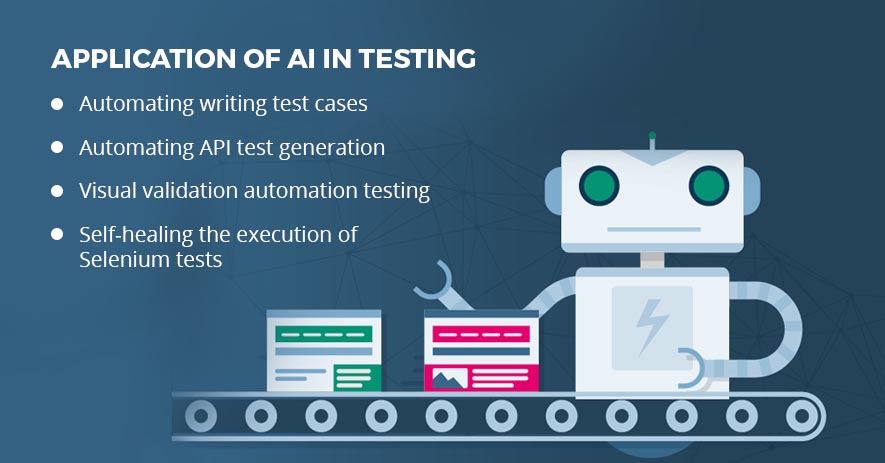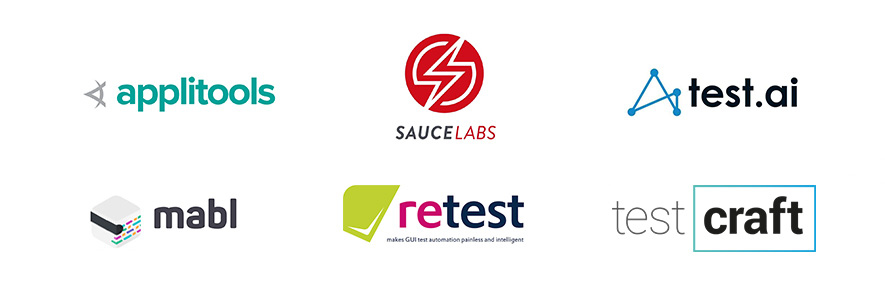How Artificial Intelligence Affects Software Testing
by Kate Libbie | January 13, 2020 2:31 pm
There are countless headlines on the net about AI and the way it transforms everything. What about its impact on software testing? How can AI testing change the future for QA? If you still don’t know the answers, it’s time to look behind the curtain of this cutting-edge technology. As always, QATestLab presents useful info to help you to be well-oriented in the latest trends.
What is Artificial Intelligence in Software Testing?
Manual and Automation[1] – these two leading testing warriors effectively go hand in hand to detect software errors and defects. Still, we have something to be improved. Line after line of ‘clicking this’, ‘checking that’ – this approach is incredibly expensive in both time and money. But AI has all chances to resolve this problem once and for all.
So, what is AI[2]? Of course, it’s less about HAL 9000 from Kubrick’s Space Odyssey, and more about algorithms and statistical models. In fact, one of the most popular applications of AI is machine learning. It is a set of algorithms that allows teaching machines to perform human-like tasks without explicitly programming procedures. Machines just learn from experience and adjust to new inputs.
What is artificial intelligence in testing? AI promises to handle repetitive, monotonous responsibilities and so free up time to more valuable work. AI software testing can deal with writing, executing, and testing code. But this is not just the automation of routine pieces of work. This procedure is continually improving as AI devices constantly learning from human input.
Artificial Intelligence vs Automated testing
Isn’t AI just automated testing? Well, although these terms are often used interchangeably, they have slightly different meanings. Automation is the part of software testing, but it can or can not be powered with Artificial Intelligence.
Automation is mainly developing an application that is adapted to do things automatically with minimal human assistance. Artificial Intelligence, in turn, is a branch of computer science and engineering of making intelligent machines.
Manual Testing and AI
So many talks about AI for automated testing and no single word about manual testing. Why so? It is logical, it is practically impossible to involve AI into hand-crafted testing. It is manual on its essence. But this doesn’t mean AI can offer nothing for manual testing. Right now we have the following solutions:
- AI can identify critical areas in the code
- AI can be used for tools to validate UI
- AI can keep the existing scripts updated automatically
Nevertheless, in most cases, AI is used for automated testing, and its main purpose is to improve automation.
Applications of AI in testing: Opportunities & Real cases
How to use AI for software testing? From functional to non-functional, it can be used for every software testing scenario. Identifying and resolving test errors and even performing usability testing – all this can be improved by AI’s advanced abilities. Here are key applications for this:

Automating writing test cases. With AI, testers can get rid of flaky test cases and maintenance of unit tests. This occurs through the following way: detecting code that isn’t covered by existing test suites, traversing the control path of the source code, figuring out which parameters need to be passed into a method under test. As a result, testers are happy because AI generates new improved unit tests.
Automating API test generation. The biggest problem with creating API is that it often requires repeating countless user’s actions. AI has a solution for this. It can recognize patterns inside the traffic, create a comprehensive data model of observed parameters, and then generate needle test that will work much more effectively.
Visual validation automation testing. Visual validation is impossible without Selenium. Still, this platform has a certain set of challenges. AI and machine learning algorithms, in turn, promise to provide self-healing at runtime to address the common maintainability problems.
Self-healing the execution of Selenium tests. Selenium is widely used for UI testing, but again this platform is far from being perfect. Users have lots of problems with maintainability and stability. AI, in turn, offers self-healing the execution of Selenium tests. These tests can find elements across all environments and learn from “human-in-the-loop” intervention.
AI & ML Tools for Automated Testing
Lots of promises from AI, but how to turn them into reality? Indeed, the easiest way to observe the power of AI is the usage of various tools and frameworks. Here are some of the most popular AI testing tools and its brief description:

Applitools. This AI software is a full-packaged automation framework that makes visual testing very easy. Tackling visual UI regression testing, Applitools easily catch any defects and errors an app may have.
Sauce Labs. This app will come in handy if there is a need to run continuous integration tests securely and efficiently. The main focus here is testing on the cloud. Sauce Labs developers use AI to gather, examine, and observe production user data to generate a smarter type of regression testing[3].
Test.AI. Test.AI is mainly used as an extension for tools like Selenium and Appium. It allows executing test cases faster and having errors or breaks a little less often. All this because test.ai can find any common element in the apps such as search text boxes, login buttons. In such a way, QA engineers don’t have to worry about all those magic IDs, CSS, or XPaths.
Mabl. Just like Test.AI, Mabl uses machine learning to eliminate the need for writing huge lines of code by hand. In Mabl language, you “train” your tests to interact with your program. When you’re done with training, your enhanced tests will run at a predetermined amount of time and alert you.
ReTest. This artificial intelligence software operates similar to all the previous AI-driven platforms. The only difference is that it is suitable for non-programmers. Here there is no need to code.
TestCraft. Another platform powered with machine learning algorithms that work on top of Selenium. It requires absolutely no programming skills. TestCraft allows manual testers to create tests quickly & eliminate maintenance overhead.
The Future of AI for Software Testing
Welcome to the world of automation with AI! The digital wagon of this modern world is already running on the machine learning driven fuel. Software testing is not an exception. AI allows QA engineers focus on more complex tasks, replacing the monotony of the testing process with the word “creation”.
All this is actually good. But, what’s next? To summarize, we can say that testing with the participation of living people will not go anywhere in the near future, but machine learning will allow us to change this work.
Have something to add? Feel free to give your opinion in the comment section below. Visit our blog to learn more about the latest trends in the world of technology and Quality Assurance / Quality Control processes.
Learn more from QATestLab
Related Posts:
- Automation: https://blog.qatestlab.com/2018/06/12/when-automate-testing/
- AI: https://blog.qatestlab.com/2018/05/16/artificial-intelligence-adoption/
- type of regression testing: https://blog.qatestlab.com/2017/02/22/regression-testing-types/
- Testing the Brains of Tomorrow’s Tech – AI and ML: https://blog.qatestlab.com/2023/07/20/testing-ai-and-ml/
- Machine Learning: explanation and its role for Automated Testing: https://blog.qatestlab.com/2020/01/29/machine-learning-automation/
- ICE Barcelona 2026: Between Poker Wins and Talks on QA in iGaming: https://blog.qatestlab.com/2026/02/03/ice-barcelona-2026-between-poker-wins-and-talks-on-qa-in-igaming/
Source URL: https://blog.qatestlab.com/2020/01/13/ai-software-testing/

